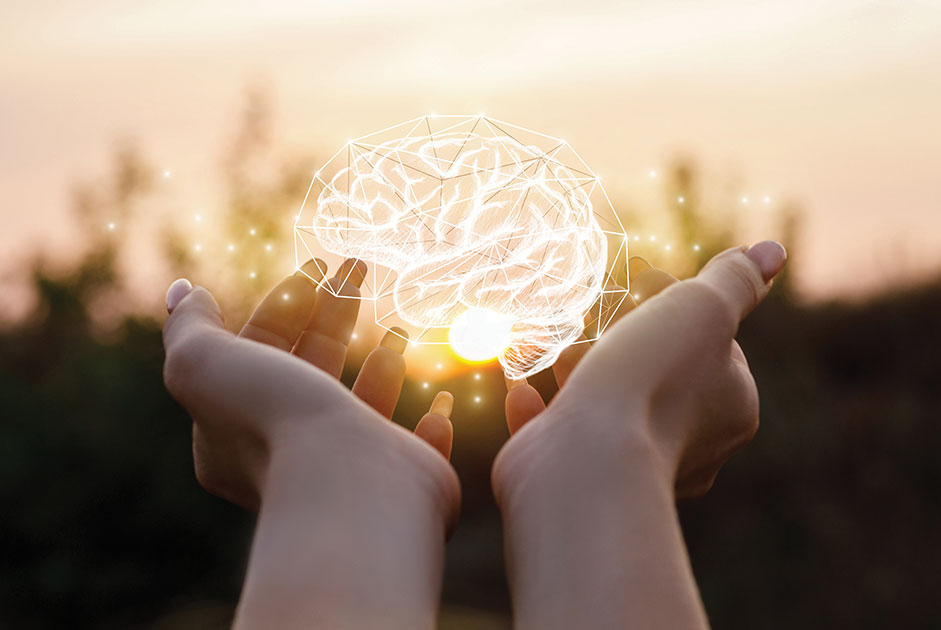The brain is a truly remarkable part of the body. It devises ingenious ways to express thoughts and emotions, it stores all our precious memories, and it coordinates our every move. Many older adults worry about how aging will affect memory and cognitive abilities. What are the causes of the decline in cognitive function? Can they be prevented?
To keep the brain sharp as we age and even reduce age-related decline in function, we need to keep our brain active and engaged! Just as with physical health, we can give the brain a regular workout to help slow down the effects of aging which translates to more resistance against problems like dementia and Alzheimer’s disease.
“Despite the stereotypes, cognitive decline is not inevitable as you age, and adopting healthy lifestyle habits can significantly reduce your risks for dementia later on in life,” says Sarah Lenz Lock, AARP’s senior vice president and executive director of the Global Council on Brain Health.
Here are some ways to keep the brain healthy and working at optimal function as you age:
Socializing
Social isolation has been shown to increase dementia in adults. A few close friends, volunteering opportunities and even a pet can help one feel more socially connected. Even if socializing in person is not possible, take the steps needed to socialize online. One study published in 2017 in the Journal of Gerontology showed that after seniors learned to use Facebook, they scored higher on memory tests than older adults who didn’t use Facebook.
Get mental stimulation
You’ve probably heard that doing crossword puzzles helps to keep your brain healthy…and it’s true! Through research with mice and humans, scientists have found that activities that exercise the brain stimulate new connections between nerve cells and may even help the brain to generate new cells. Any mentally stimulating activity is good for your brain. Playing word games, chess, reading, taking classes, solving puzzles or doing math problems are all beneficial. Or get in touch with your creative side! Drawing, crafting or painting help stimulate brain function as well. Playing chess is a win-win for brain health. It stimulates brain cells and fosters social interaction.
Eat well for your brain
Good nutrition can help your mind as well as your body. Adults who follow a Mediterranean diet consisting of fish and foods such as fruits, vegetables, nuts and olive oil, while limiting red meat, lower their risk for Alzheimer’s disease by up to 40%. Some great foods to incorporate into a brain boosting diet include: fish (high in Omega 3), coffee, blueberries, turmeric and nuts. Drinking coffee over the long-term is linked to a reduced risk of neurological diseases such as Parkinson’s and Alzheimer’s. The largest risk reduction was seen in those adults who consume 3-4 cups daily…so savor that cup ‘a joe!
Exercise
Research shows that moving your body also helps your brain. Exercise also increases the development of new nerve cells and increases the connections between brain cells. The outcome is a brain that is more efficient and resilient. Exercise also lowers blood pressure, improves cholesterol, helps regulate blood sugar, and reduces mental stress, all of which helps your brain as well as your heart. Exercising outdoors in fresh air may provide another bonus. Taking in natural surroundings and daylight assists brain function by reducing stress and increasing melatonin for a more regular sleep-wake cycle.
Watch those numbers
High blood pressure, diabetes, and high cholesterol are all associated with an increased risk of dementia. You can keep these problems at bay by maintaining a healthy weight, exercising regularly, limiting your alcohol, not smoking, reducing stress, and eating nourishing food. Also, talk to your doctor about getting on a low-dose aspirin regimen. This is not for everyone, but can reduce the risk of dementia for some. Be sure to check with your doctor to see if this might be right for you. Research connecting poor physical health with deteriorating brain health is increasing. While some factors affecting brain health cannot be changed, there are many lifestyle changes that can make a big difference.
NIA Alzheimer’s and related Dementias Education and Referral (ADEAR) Center
800-438-4380 (toll-free)
adear@nia.nih.gov
www.nia.nih.gov/alzheimers
The National Institute on Aging’s ADEAR Center offers information and free print publications about Alzheimer’s and related dementias for families, caregivers, and health professionals. ADEAR Center staff answer telephone, email, and written requests and make referrals to local and national resources.






















